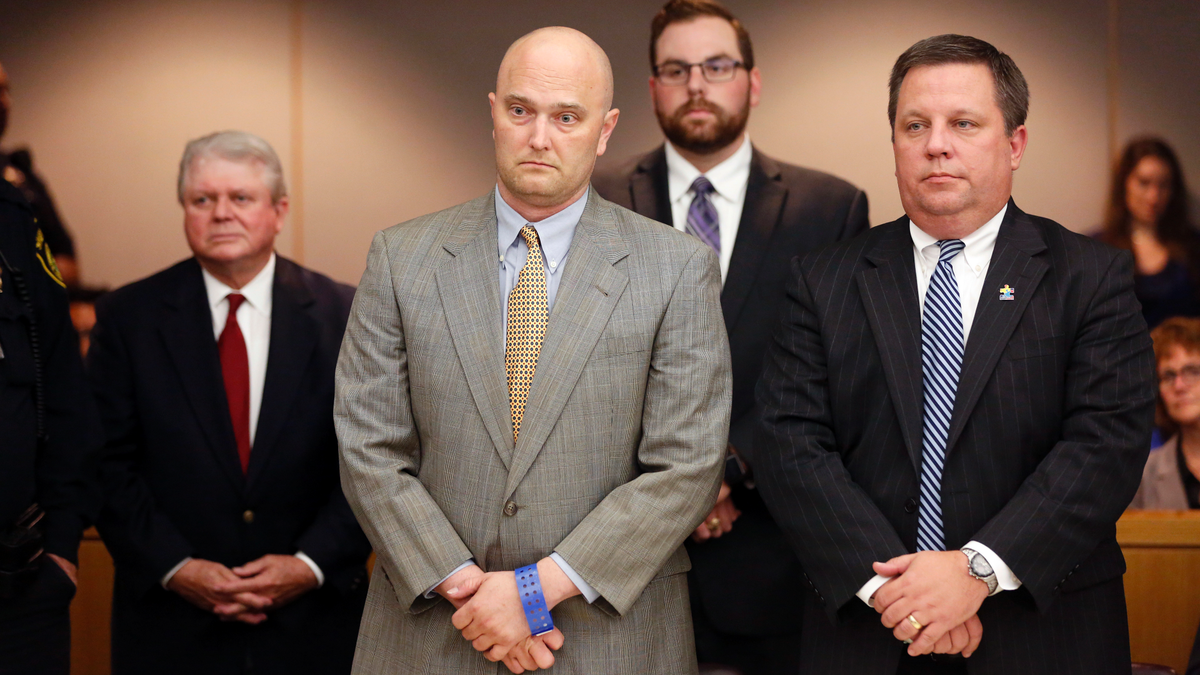
DALLAS – A Texas jury gave a white former police officer too lenient of a punishment when sentencing him to 15 years for the shooting death of an unarmed black teenager who was in a car leaving a house party, the victim's family members said.
Roy Oliver fired into the car filled with teens the night of the April 2017 party in suburban Dallas, killing 15-year-old Jordan Edwards.
"He can actually see life again after 15 years and that's not enough because Jordan can't see life again," Edwards' stepmother, Charmaine Edwards, said of Oliver after he was sentenced Wednesday night.
She praised the jury's decision to convict Oliver of murder, but she wanted that same jury to send Oliver to prison for a longer period.
Daryl Washington, an attorney for Edwards' father, said the sentence could have been longer but still sends a message.
"We know that there are parents all over this country who would love to see the person who took the life of their kid spend the next 15 years in prison," Washington said.
Prosecutors had asked for a minimum of 60 years in prison. The jury, which featured two black members out of 12 jurors and two alternates, acquitted Oliver on two lesser charges of aggravated assault stemming from the shooting.
The murder conviction was extremely rare for a shooting involving an on-duty officer. Oliver's defense team said it had already begun the process of appealing. His attorneys said he would be eligible for parole after 7 ½ years, but they also said they were concerned about his safety in prison and that authorities will take extra precautions to protect him.
Oliver is being held in protective custody, alone in a single cell at the Dallas County jail, said Dallas County sheriff's department spokesman Raul Reyna.
"For his safety, we take those precautions," he said, mentioning the status is typical for former officers who are jailed.
Oliver, he said, is allowed up to an hour of recreation time a day.
Oliver was a police officer in the community of Balch Springs when he and his partner responded to reports of underage drinking at the party. Oliver fired into a car carrying Edwards and his friends, later saying he feared the vehicle was moving toward and endangering his partner. Edwards, who was in the front passenger seat, was shot.
The jury deliberated late into the night before settling on a prison sentence, which also included a $10,000 fine. Earlier, they heard from Oliver's mother, Linda, who said he was a good man and a devoted father and asked jurors for a five-year sentence, saying her young grandson needs his father's support.
"He needs his father's love. He needs his father's income. He needs his father's guidance," she said.
Oliver's wife also testified, saying in Spanish through an interpreter that she was concerned about their 3-year-old son, who is autistic. But the ex-officer's half sister took the stand against him, saying she felt compelled to do so after listening to testimony during the trial and that she hoped he "gets what he deserves."
Earlier Wednesday, Dallas County District Attorney Faith Johnson called Oliver a "killer in blue" and told jurors they could send a message that bad officers will not be tolerated.
Police initially said the vehicle backed up toward officers "in an aggressive manner," but later admitted that bodycam video showed the vehicle was moving forward as officers approached. Oliver's partner told jurors he didn't believe his life was ever in danger.
Investigators said no guns were found in the vehicle. Oliver was fired from the Balch Springs Police Department days after the shooting.
Oliver still has two pending aggravated assault charges tied to the shooting. He has another two pending aggravated assault charges from an unrelated incident about two weeks before the shooting, in which he is accused of pointing a firearm after being rear-ended.
It's extremely rare for police officers to be tried and convicted of murder for shootings that occurred while they are on duty. Only six non-federal police officers have been convicted of murder in such cases — and four of those convictions were overturned — since 2005, according to data compiled by criminologist and Bowling Green State University professor Phil Stinson.
Edwards' father has also filed a civil lawsuit in connection to the shooting. The jury's decision is not just about Jordan Edwards, but all other black men and women who have been killed and not received justice, said Washington, the attorney for the teen's father.
___
Sign up for the AP's weekly newsletter showcasing our best reporting from the Midwest and Texas: http://apne.ws/2u1RMfv





















